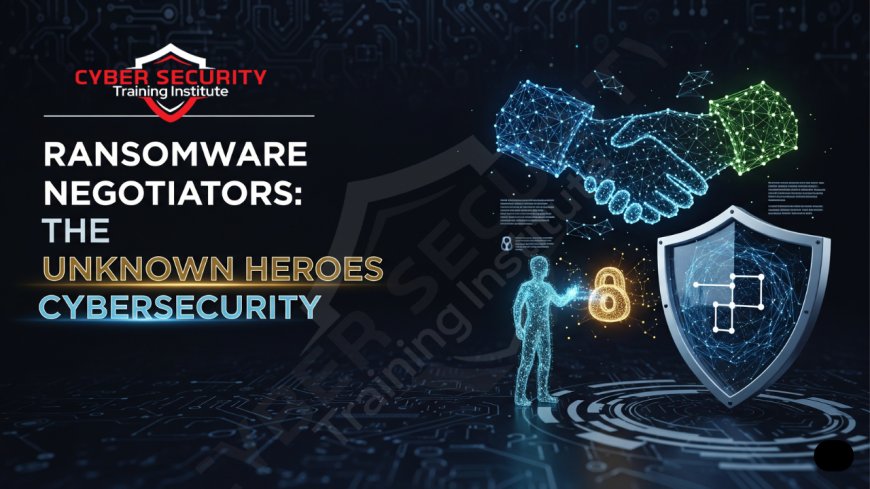Ransomware Negotiators | The Unknown Heroes of Cybersecurity
In today’s digital world, cybercrime is a growing threat, and one of the most insidious forms is ransomware. Imagine waking up to find your company’s critical data locked, with a menacing message demanding payment to regain access. Panic sets in, but who do you turn to? Enter ransomware negotiators—unsung heroes who step into the chaos, working behind the scenes to mitigate damage, negotiate with criminals, and help organizations recover. This blog post dives into the fascinating and often misunderstood world of ransomware negotiators, exploring their role, skills, and the critical impact they have on cybersecurity.

Table of Contents
- What Is Ransomware?
- Who Are Ransomware Negotiators?
- The Role of Ransomware Negotiators
- Skills and Qualities of a Ransomware Negotiator
- The Negotiation Process
- Ethical Considerations in Ransomware Negotiation
- Case Studies: Real-World Examples
- Impact on the Broader Cybersecurity Landscape
- Challenges Faced by Ransomware Negotiators
- The Future of Ransomware Negotiation
- Conclusion
- Frequently Asked Questions (FAQs)
What Is Ransomware?
Ransomware is a type of malicious software (malware) that encrypts a victim’s data, making it inaccessible until a ransom is paid, usually in cryptocurrency like Bitcoin. Cybercriminals use ransomware to extort money from individuals, businesses, or even entire cities. In 2023 alone, ransomware attacks cost organizations billions of dollars, with high-profile cases affecting hospitals, schools, and government agencies. The stakes are high, and the consequences of mismanaging an attack can be catastrophic, leading to data loss, financial ruin, or reputational damage.
Who Are Ransomware Negotiators?
Ransomware negotiators are specialized cybersecurity professionals who act as intermediaries between victims and attackers. They are often part of incident response teams or work for specialized firms that handle cyber extortion cases. These professionals are trained to communicate with cybercriminals, assess the situation, and negotiate terms to minimize damage. Think of them as diplomats in the murky world of cybercrime, balancing technical expertise with psychological insight to navigate high-pressure situations.
The Role of Ransomware Negotiators
Ransomware negotiators wear many hats. Their primary goal is to help victims regain access to their data while minimizing financial and operational losses. Their responsibilities include:
- Assessing the Attack: Determining the type of ransomware, the scope of the encryption, and whether decryption is possible without paying.
- Communicating with Attackers: Engaging with cybercriminals through encrypted channels, often via email or dark web platforms.
- Negotiating Ransom: Working to reduce the ransom demand or buy time for recovery efforts.
- Advising Victims: Guiding organizations on whether to pay the ransom, based on legal, ethical, and practical considerations.
- Coordinating Recovery: Collaborating with IT teams to restore systems, whether through decryption keys or backups.
Negotiators don’t just “pay the bad guys.” They strategize to protect the victim’s interests while navigating a complex and often unpredictable landscape.
Skills and Qualities of a Ransomware Negotiator
Being a ransomware negotiator requires a unique blend of skills. It’s not just about technical know-how; it’s about staying calm under pressure and outsmarting criminals. Key skills include:
- Technical Expertise: Understanding ransomware variants, encryption methods, and cybersecurity protocols.
- Negotiation Skills: Using tactics like active listening and persuasion to influence attackers.
- Psychological Insight: Reading the attacker’s motives and behavior to predict their next moves.
- Communication: Explaining complex situations to non-technical stakeholders, like CEOs or legal teams.
- Ethics and Integrity: Balancing the victim’s needs with legal and moral considerations.
Negotiators must also be adaptable, as no two ransomware cases are identical. They often work long hours under intense pressure, making quick decisions that can save or sink a company.
The Negotiation Process
The negotiation process is a delicate dance. Here’s a simplified overview of how it typically unfolds:
- Initial Contact: The attacker provides a ransom note with demands and a deadline. The negotiator establishes communication, often through a secure portal or email.
- Assessment: The negotiator evaluates the ransomware strain, checks for backups, and assesses whether decryption tools are available.
- Engagement: The negotiator engages the attacker, asking for proof that the data can be decrypted (e.g., a sample file).
- Bargaining: The negotiator may offer a lower ransom, citing financial constraints or other factors, to reduce the demand.
- Resolution: If payment is made, the negotiator ensures the decryption key works. If payment is avoided, they pivot to recovery through backups or other means.
Here’s a table summarizing key ransomware variants and their characteristics:
| Ransomware Variant | Description | Typical Targets |
|---|---|---|
| WannaCry | Exploits Windows vulnerabilities, spreads rapidly. | Hospitals, government agencies |
| Ryuk | Targeted attacks, often via phishing emails. | Large corporations |
| LockBit | Fast encryption, data theft for double extortion. | Small to medium businesses |
| Conti | Sophisticated, often demands high ransoms. | Healthcare, education |
Ethical Considerations in Ransomware Negotiation
Negotiating with criminals raises ethical questions. Should you pay a ransom, knowing it funds illegal activities? What if the data is critical, like patient records in a hospital? Negotiators must weigh these dilemmas:
- Funding Crime: Paying a ransom may encourage more attacks, but refusing could lead to data loss or harm to individuals.
- Legal Risks: In some countries, paying ransoms to certain groups (e.g., those on sanctions lists) is illegal.
- Trust Issues: There’s no guarantee attackers will provide a working decryption key or refrain from leaking stolen data.
Many negotiators advocate for prevention over payment, emphasizing strong cybersecurity practices like regular backups and employee training.
Case Studies: Real-World Examples
Let’s look at two real-world examples where ransomware negotiators made a difference:
- Colonial Pipeline (2021): A major U.S. fuel pipeline was hit by the DarkSide ransomware group, disrupting fuel supplies. Negotiators worked with the company to assess the attack and ultimately facilitated a $4.4 million ransom payment. While controversial, this decision minimized downtime, and negotiators ensured the decryption process was smooth.
- University of California (2020): The university faced a NetWalker ransomware attack targeting its medical research data. Negotiators reduced the initial $3 million demand significantly and advised against payment, as backups were available. The university restored its systems without paying, thanks to the negotiators’ strategic guidance.
These cases highlight the negotiators’ ability to adapt to unique situations, balancing immediate needs with long-term consequences.
Impact on the Broader Cybersecurity Landscape
Ransomware negotiators don’t just solve individual cases; they shape the cybersecurity industry. By analyzing attack patterns, they provide insights that help develop better defenses. They also advocate for stronger regulations and international cooperation to combat cybercrime. Their work informs organizations about vulnerabilities, encouraging investments in cybersecurity training and infrastructure. In a way, negotiators are the bridge between victims and the broader fight against cybercrime.
Challenges Faced by Ransomware Negotiators
The job isn’t easy. Negotiators face numerous challenges, including:
- High Stakes: A wrong move could lead to data loss or escalated demands.
- Anonymity: Attackers operate anonymously, making it hard to predict their behavior.
- Time Pressure: Deadlines set by attackers create intense pressure to act quickly.
- Emotional Toll: Dealing with distressed clients and unethical criminals can be mentally exhausting.
Despite these challenges, negotiators remain calm and strategic, often working behind the scenes without public recognition.
The Future of Ransomware Negotiation
As ransomware evolves, so will the role of negotiators. Artificial intelligence and machine learning are being used to predict attacker behavior and identify ransomware strains faster. However, cybercriminals are also leveraging AI, making attacks more sophisticated. Negotiators will need to stay ahead by adopting new technologies and collaborating globally to disrupt ransomware gangs. Governments are also cracking down, with initiatives like the U.S. Cybersecurity and Infrastructure Security Agency (CISA) promoting “no ransom” policies and better cybersecurity practices.
Conclusion
Ransomware negotiators are the unsung heroes of cybersecurity, navigating the dangerous intersection of technology and crime. Their expertise, cool-headedness, and ethical judgment help organizations survive some of their darkest moments. While their work often goes unnoticed, their impact is profound, saving data, livelihoods, and even lives. As ransomware threats grow, the role of negotiators will only become more critical. By understanding their work, we can better appreciate the importance of cybersecurity and the need for prevention, preparedness, and resilience in the face of cybercrime.
Frequently Asked Questions (FAQs)
What is ransomware?
Ransomware is malicious software that locks your data and demands payment to unlock it.
Who are ransomware negotiators?
They are cybersecurity experts who mediate between victims and attackers to resolve ransomware incidents.
Do negotiators always pay the ransom?
No, they explore all options, like backups or decryption tools, and only advise payment as a last resort.
Is paying a ransom illegal?
It depends on the country and the attacker. Paying sanctioned groups may be illegal in some jurisdictions.
How do negotiators communicate with attackers?
They use secure channels like encrypted email or dark web platforms provided by the attackers.
What skills do ransomware negotiators need?
Technical knowledge, negotiation tactics, psychological insight, and strong communication skills.
Can all ransomware be negotiated?
Not always. Some attackers are inflexible, and negotiation depends on the situation and strain.
How do negotiators reduce ransom demands?
They use tactics like citing financial hardship or delaying to lower the attacker’s demands.
Do attackers always provide decryption keys?
No, there’s no guarantee, which is why negotiators verify keys before advising payment.
What is double extortion?
Attackers encrypt data and threaten to leak it unless a ransom is paid.
How long does a negotiation take?
It varies, from hours to weeks, depending on the attacker’s demands and deadlines.
Can backups eliminate the need for negotiation?
Yes, robust backups can allow victims to restore data without engaging attackers.
Are ransomware negotiators part of law enforcement?
Usually not. They work for private firms or as consultants, though they may coordinate with law enforcement.
How do negotiators stay anonymous?
They use secure, encrypted communication tools to protect their identity and the victim’s.
What happens if a ransom isn’t paid?
Data may remain locked, or attackers may leak it, depending on the ransomware strain.
Can negotiators prevent future attacks?
They advise on cybersecurity improvements but can’t guarantee prevention.
How do negotiators handle emotional clients?
They use empathy and clear communication to guide clients through high-stress situations.
Are there ethical issues with negotiating?
Yes, paying ransoms may fund crime, but negotiators prioritize the victim’s immediate needs.
How is AI changing ransomware negotiation?
AI helps analyze attacks and predict behavior, but attackers also use AI to create sophisticated ransomware.
Why don’t negotiators get more recognition?
Their work is sensitive and often confidential, so they operate behind the scenes.
What's Your Reaction?
 Like
0
Like
0
 Dislike
0
Dislike
0
 Love
0
Love
0
 Funny
0
Funny
0
 Angry
0
Angry
0
 Sad
0
Sad
0
 Wow
0
Wow
0















